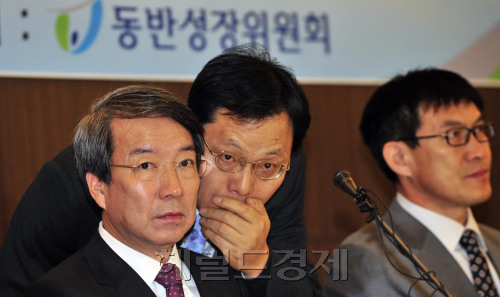Former Prime Minister Chung Un-chan criticized the country’s large firms on Tuesday, asking that they feel greater social responsibility after a government commission failed to vote on a controversial profit-sharing plan.
The Commission on Shared Growth for Large and Small Companies planned to reach a decision on the plan that would have required large firms to share profits with smaller ones in its first-anniversary event in Yeouido.
 |
Shared growth commission chief Chung Un-chan (left) listens to a panel official during the committee meeting on Tuesday. (Kim Myung-sub/The Korea Herald) |
However, the event was ditched by all nine conglomerate-appointed members of the 25-member commission as they, including the Federation of Korean Industries, accused the commission of attempting to implement the plan without consensus.
“Now is the time for the heads of conglomerates to show greater social responsibility, contribution and sacrifice,” said Chung, who is currently leading the commission on balanced growth. “They need to know that the president, government and people are watching their moves involving mutual growth.”
In response, the country’s largest business lobby FKI said there is “no country in the world that operates this type of profit-sharing plan.”
Under the plan, large conglomerates will be pushed to voluntarily share what is labeled “excess profit” with their suppliers. As an exemplary case, the big firms will be encouraged to give a portion of their profits to the smaller companies if they achieve more profit than they expected at the beginning of the year.
With the conglomerates objecting to its implementation, the rest of the commission have agreed to reach a decision on whether to introduce the strongly debated system into the local market, according to commission officials.
“We’re well-aware of the large-scale firms’ efforts which played the growth engine role for the country’s economy, but that doesn’t mean they could be exempted from providing social responsibility,” Chung said. “The market economy could be maintained in the long term only through achieving faith in justice and fair order.”
By Cho Ji-hyun (
sharon@heraldcorp.com)








